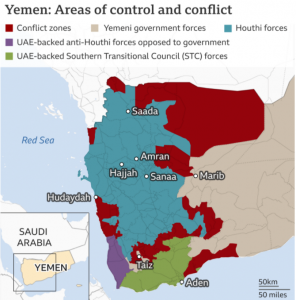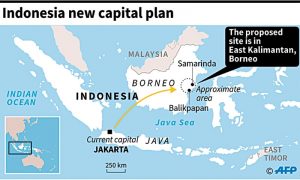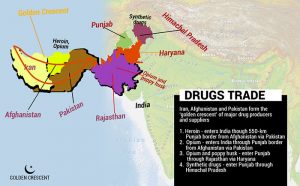THE ART & CULTURE
1. A.P. GOVT. BANS 100-YEAR-OLD ‘CHINTAMANI PADYA NATAKAM’
THE CONTEXT: The Andhra Pradesh government has brought the curtains down on the popular ‘Chintamani Padya Natakam’, which has enthralled people for almost 100 years.
THE EXPLANATION:

- Telugu play writer Mahakavi Kallakuri Narayana Rao who was also a social reformer, cinematographer, and nationalist wrote the play Chintamani around 100 years ago, which was very popular on stage. It was also made into a movie twice in Telugu once in 1933 & in 1956 with NT Rama Rao, Bhanumathi, and Jamuna in the lead roles.
- The Arya Vaishyas or baniya community in Andhra have been portrayed in such a manner and they have been up in arms against the play for a long time. The issue had cropped during the centenary celebrations of the play which was held in Eluru of West Godavari.
THE INTERNATIONAL RELATIONS
2. INDIA EXTENDS ANOTHER $500 MILLION LOC TO SRI LANKA
THE CONTEXT: India extended a $500 million-Line of Credit (LOC) to Sri Lanka for urgent fuel imports, days after providing $900 million relief to the island nation facing one of its worst economic downturns.
THE EXPLANATION:
- According to the Ministry of External affairs the emergency assistance Sri Lanka had sought from India to tide over its dollar crunch leading to a shortage of essentials, including fuel, medicines, and certain food supplies.
- These measures are in line with India’s commitment to stand with Sri Lanka, contribute to Sri Lanka’s economic growth and impart greater momentum to bilateral economic and commercial partnership.”
- The LoC from India coincides with Sri Lanka’s central bank servicing a sovereign bond for $500 million, and also with reports on likely power outages owing to a shortage of fuel supply amid the persisting dollar crisis.
What is the current economic situation in Sri Lanka?
- Poor state of tourism industry: The tourism industry, which represents over 10% of the country’s Gross Domestic Product and brings in foreign exchange, has been hit hard by the Easter Sunday terror attacks of 2019 and coronavirus pandemic.
- Shortage of forex reserves: As a result, forex reserves have dropped from over $7.5 billion in 2019 to around $2.8 billion in July 2021.
- Depreciation of currency: The printing of Rs. 800 billion by the Central Bank of Sri Lanka over the last 18 months to ease the economic crisis has increased liquidity in the economy. But this infusion of money, and the consequent increase in demand without a corresponding increase in supply, has led to a sharp spike in inflation. This in turn has devalued the currency, made imports costlier, added to the debt, and put the forex reserves under more pressure. So, the value of the Sri Lankan rupee has depreciated by around 8% in 2021.
- Rise in price of food items: It has to be noted that the country depends heavily on imports to meet even its basic food supplies. So the price of food items has risen in tandem with the depreciating rupee. The government’s ban on the use of chemical fertilizers in farming has further aggravated the crisis by dampening agricultural production.
- High debt: Its public debt-to-GDP ratio was at 109.7% in 2020, and its gross financing needs to remain high at 18% of GDP, higher than most of its emerging economy peers. More than $2.7 billion of foreign currency debt will be due in the next two years.
3. THE HOUTHI ATTACK ON THE UNITED ARAB EMIRATES
THE CONTEXT: A suspected drone attack in Abu Dhabi, the capital of the United Arab Emirates (UAE), caused multiple explosions in which three people were killed —two Indians and one Pakistani.
THE EXPLANATION:
- The Shia Houthi rebels of Yemen, who have been controlling the northern parts of the country, including the capital Sana’a, for almost seven years, have claimed responsibility for the attack.
- While the UAE hasn’t confirmed the Houthi claims. Also the Saudi-led coalition that is fighting the Houthis in Yemen, launched air strikes on Sana’a.
Who are the Houthis?
Founded in the 1990s by Hussein Badreddin al-Houthi, a member of Yemen’s Shia majority, the Houthi movement has a pretty straight forward slogan or sarkha: “God is great, death to America, death to Israel, curse on the Jews, victory to Islam.” After Yemeni soldiers killed Hussein in 2004, his brother Abdul Malik took over.
How did Saudi Arabia get involved?
The rise of the Houthis sent alarm bells ringing across Sunni Arab states, particularly Saudi Arabia. A Saudi-led coalition — backed by the US, UK and France — then launched an air campaign in Yemen, with the aim of defeating the rebel group. What the coalition thought would take only a few weeks has stretched on for seven years, growing into a full-blown civil war.

4. INDONESIA RELOCATE CAPITAL TO BORNEO
THE CONTEXT: Indonesia’s parliament has approved a bill to relocate the nation’s capital from Jakarta to a jungled area of Kalimantan on Borneo Island.
THE EXPLANATION:
- The new centre will be called “Nusantara”, a Javanese name for the Indonesian archipelago, also “the new capital has a central function and is a symbol of the identity of the nation, as well as a new centre of economic gravity,”
- Plans to relocate the government from Jakarta, a bustling megacity of 10 million people that suffers from chronic congestion, floods and air pollution, have been floated by multiple presidents, but none have made it this far.
- Southeast Asia’s largest economy has envisioned the newcapital as a low-carbon “superhub” that will support pharmaceutical, health and technology sectors and promote sustainable growth beyond Java island.
- But critics say the law was rushed through with limited public consultation and environmental consideration.

THE ECONOMIC DEVELOPMENT
5. THE DEVAS-ANTRIX DEAL
THE CONTEXT: The Supreme Court has upheld the liquidation of Devas, whose foreign investors continue to fight for compensation following the cancelled 2005 satellite deal with Antrix.
THE EXPLANATION:
- A 2005 satellite deal between Antrix Corporation — the commercial arm of the Indian Space Research Organisation (ISRO) – and Devas Multimedia Pvt Ltd, a start-up headquartered in Bengaluru, is at the heart of a global legal tussle between the Indian government and foreign investors in Devas.
- The tussle is a fallout of the cancellation of the deal in 2011 by the then UPA government citing requirement of satellite spectrum allotted to Devas for security purposes.
What was the Devas-Antrix deal?
- They signed an “Agreement for the Lease of Space Segment Capacity on ISRO/Antrix S-band spacecraft by Devas Multimedia Pvt Ltd” on January 28, 2005, a month after Devas was incorporated in Bengaluru in December 2004 by two former ISRO employees.
- Under the deal, ISRO would lease to Devas two communication satellites (GSAT-6 and 6A) for 12 years for Rs 167 crore. Devas would provide multimedia services to mobile platforms in India using S-band transponders on the satellites, with ISRO leasing 70 MHz of S-band spectrum.
- The deal progressed smoothly for six years before it was annulled by the UPA government on February 25, 2011, following a Cabinet Committee on Security decision of February 17 to terminate the agreement to use the S-band for security purposes. The government decision was taken in the midst of the 2G scam and allegations that the Devas deal involved the handing over of communication spectrum valued at nearly Rs 2 lakh crore for a pittance.
What is the current Issue?
- After the NDA government came to power in 2014, the CBI was asked to investigate the 2005 deal. In August 2016, the CBI filed a chargesheet against eight officials from Devas, ISRO and Antrix linked to the deal for “being party to a criminal conspiracy with an intent to cause undue gain to themselves or others by abusing official positions”.
- Among the eight is former ISRO chairman G Madhavan Nair and former Antrix executive director K R Sridharamurthi. The CBI has charged the accused of causing a loss of approximately Rs 578 crore to the government through the deal.
- The ED filed a chargesheet in 2018 under the Prevention of Money Laundering Act against a former managing director of Antrix and five Devas officials, stating that Devas transferred 85% of its Rs 579 crore foreign funding to the US under various claims.
What led to the liquidation?
Antrix filed a plea in the National Company Law Tribunal in January 2021 for liquidation of Devas in India, which it said was incorporated in a fraudulent manner. The NCLT order held that the start-up was “incorporated in a fraudulent manner and for unlawful purposes”.
THE SCIENCE AND TECHNOLOGY
6. WEB 3.0 NEXT PHASE OF INTERNET
THE CONTEXT: Web 3.0 is the potential next phase of the internet wherein the internet will be decentralized and run on blockchain technology.
THE EXPLANATION:
THE CONCEPT OF WEB 3.0:
It is used to describe a potential next phase of the internet, created quite a buzz in 2021. The model, a decentralized internet to be run on blockchain technology, would be different from the versions in use, Web 1.0 and Web 2.0. In web3, users will have ownership stakes in platforms and applications unlike now where tech giants control the platforms.
EARLIER VERSIONS
- Web 1.0 was mostly static where users would go to a website and read and interact with static information; The differentiating characteristic of Web 2.0, which we use now, is that users can create content.
- In Web 2.0, most of the data in the internet and the internet traffic are owned or handled by a few large companies creating issues of data privacy, data security and abuse of data. Web3 offers a solution to these problems.
What are some of the concerns?
In Web 2.0, most of the data on the internet and the internet traffic are owned or handled by very few behemoth companies. This has created issues related to data privacy, data security and abuse of such data. It is in this context that the buzz around Web3 is significant.
THE INTERNAL SECURITY
7. THE ‘HYBRID TERRORISTS’ IN JK
THE CONTEXT: Jammu and Kashmir Police that biggest challenge for security forces in the union territory are going to be hybrid terrorists. Hybrid terrorists are those who are not listed with the security forces and are only brought in by terror groups just once or twice to carry out terrorist attacks.
THE EXPLANATION:
According to JK Police, there are two biggest challenges with regard to terrorism, they are
- Hybrid Terrorism
- Narco-terrorism
Hybrid Terrorism:
In 2021, Kashmir valley saw dozens of attacks soft targets like civilians, policemen (on leave), political workers and people from minority communities. Security forces are now focussing on identification of such hybrid terrorists.
Narco Terrorism:
The security forces are facing in the Kashmir Valley is narco-terror. Tons of narcotics have been recovered by security forces in various districts of the Kashmir valley and security agencies believe that the money from these drugs is being used by the terror outfits. The arms and ammunition are mostly bought from money generated through drug trafficking. These drugs are sold in different parts of the country.
Kashmir is very near to Golden Crescent

THE PRELIMS PRACTICE QUESTIONS
QUESTION OF THE DAY 19TH JANUARY 2022
Q1. Consider the following statements about National Commission for Women:
- It is neither constitutional nor a statutory body.
- It consists of one chairman and other five members.
- They are nominated by the central government.
Which of the statement given above is/are correct?
a) 1 and 2 only
b) 2 and 3 only
c) 3 only
d) 1, 2 and 3
ANSWER FOR 18TH JANUARY 2022.
Answer: a)
Explanation:
- Statement 1 is incorrect: Kathak is a prominent ancient Indian classical dance and is thought
to have started from the wandering bards of North India (Uttar Pradesh) known as Kathakars, meaning storytellers.
- Statement 2 is correct: The foundations of Kathak are rooted in Natya Shastra, an ancient
Sanskrit text written by Bharata Muni.
- Statement 3 is correct: Kathakars convey stories through rhythmic foot movements, hand
gestures, facial appearances and eye work.
Spread the Word
